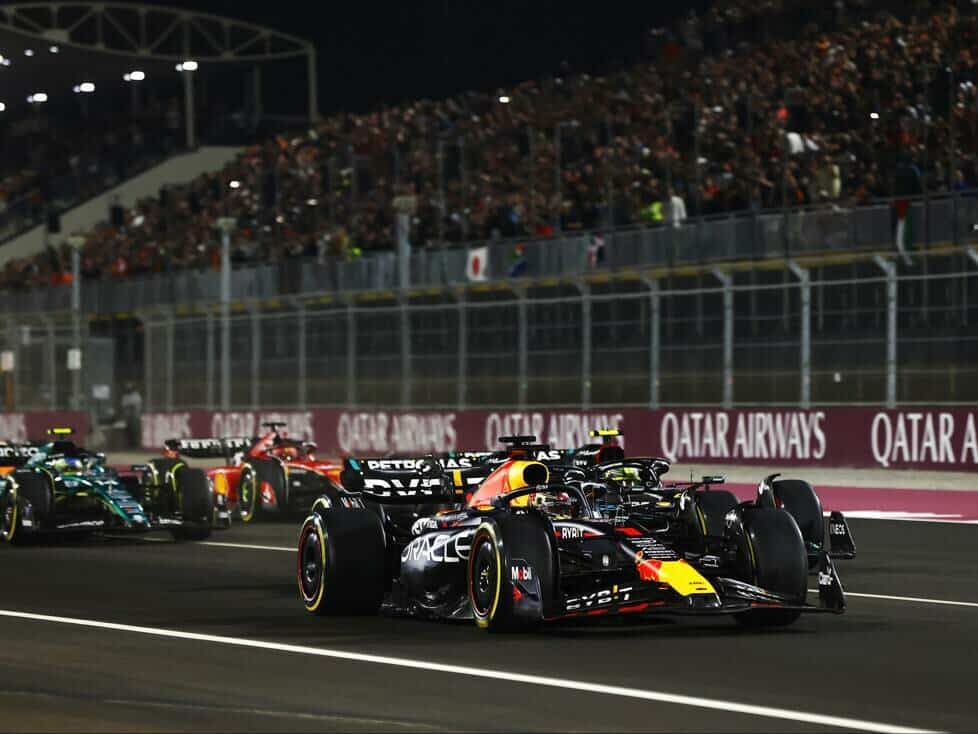On Monday we’ll publish our scores for all 20 riders at the Qatar 2023 Grand Prix, but we need your help to do it!
It’s one thing who won the Qatar Grand Prix at the Losail International Circuit near Doha. But it may be another thing which drivers gave the best performance. Because in Formula 1, it’s not only the performance of the driver that counts. It’s the performance of the car he has at his disposal and, of course, that of the team that counts.
It is extremely difficult to look at the performance of the driver in isolation from the other factors. Nevertheless, we dare to try. Our grading system consists of three pillars. Firstly, the fans. Our users now have the opportunity to rate the performances of all 20 drivers. Analogous to the school grading system from 1 (very good) to 6 (not enough).
Second: the expert. As in previous years, Marc Surer grades the performances of Max Verstappen & Co. And thirdly: the editorial team. We conduct our own little voting in our Formula 1 core team.
The three pillars then flow into the overall score for the weekend in equal thirds. In the end, the result is the ultimate ranking – which is wonderful to discuss!
Our format is inspired by the grades that football magazines, for example, give out after each match. But grading only as an editorial team was too subjective for us. So, in order to arrive at the most balanced verdict possible, we are asking our expert and our users for their help.
Guide: How should you give your marks?
For orientation: For grade 1, a driver should have already achieved something very special. For example, in relation to his team mate. Grade 2 is a very, very good performance by a world-class rider who is only missing one special element. Grade 3 and grade 4 are good and bad average respectively – so actually still quite good!
Grade 5 is given for rather poor performances, such as when a driver is clearly dominated by his team-mate throughout the weekend or delivers an average performance and then has an avoidable accident. Grade 6 should only be given for the category “brainfade” – i.e. if a driver has done something particularly stupid.
Try to evaluate objectively! Of course, that’s not always easy. But whether you are a fan of Max Verstappen or Fernando Alonso should not play a role in awarding the grade. No one will ever be able to completely detach themselves from personal preferences and prejudices. But at least trying contributes to a fairer grading system.
Don’t be blinded by outside influences! The grade should only take into account what the rider himself had in hand. For example: Are degrading tyres a driver factor or an external factor? If the tyres degrade because the driver braked shortly before, this should have a negative effect on the grade. If the tyres degrade because there is a material defect, there should be no deductions.
Weight the races the most! That’s the only place you get points. Sunday’s performance (with qualifying on Friday) should account for about two-thirds of the grade. Saturday with F1 sprint and sprint shootout one third. The qualifying sessions can then change the grade if a driver has done something very special there or even if he has made a particularly stupid mistake. A ride-out in the first free practice session in which a front wing flies off might cost a few minutes of practice time. One on Sunday might cost him the win.
Remember who’s in what car! It’s easier to drive a Red Bull without making mistakes than a Haas. That partly puts it into perspective when Verstappen takes pole with an outstanding lead and Nico Hülkenberg spins. Maybe that wouldn’t have happened to him in a Red Bull. But …
… Always ask yourself: if two drivers were in the same car, who would perform better? So one of the less talented drivers, even with a strong performance for him, might get a 3 or 4 at most. Because in the same car, even on a good weekend, he would still perform worse than a Verstappen on a bad one. And …
… also takes into account: Of course, Formula 1 drivers can be compared most easily and directly with their team colleagues. But it makes a difference if Sergio Perez gets half a second per lap from an exceptional driver like Verstappen, or if a driver is half a second slower than a teammate who used to be dominated by Verstappen.
Don’t take it too seriously! Of course, our grading system is meant to be an attempt to objectively rank driver performance. Ultimately, that is never 100 per cent possible. Everyone evaluates things a little differently for themselves, and that’s okay. That’s why there are three pillars as a mutual corrective. You can criticise others for their opinions. But it should always be done with the necessary respect! For example, in discussions in our community on social media.





